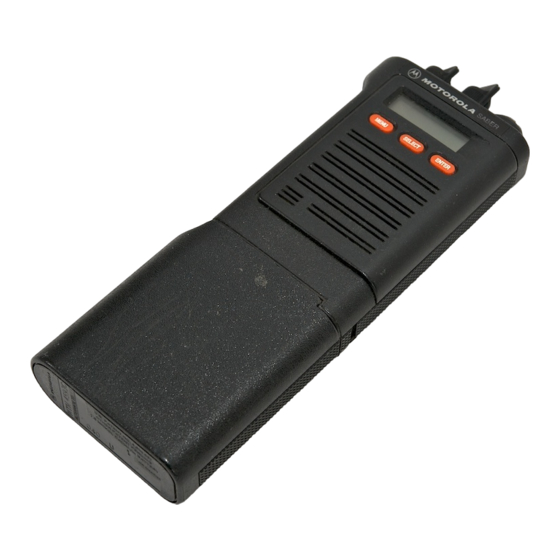Motorola SABER R Посібник з експлуатації - Сторінка 8
Переглянути онлайн або завантажити pdf Посібник з експлуатації для Портативний радіоприймач Motorola SABER R. Motorola SABER R 29 сторінок.

.
SERVICING MAJOR SUBASSEMBLIES
A. Baseplate
All repairs
to the
baseplate assembly can (and
should) be made
with the radio
chassis
inside the
radio
After the slotted-spanner nuts are loosened, the
baseplate
is held
in
place by a screw.
The
retainers holding the slotted-spanner
nuts
in
place are
not
reusable. Replacement
of the
retainers
requires special insertion procedures;
refer to the
instruction
sheet
provided
with the
slotted-spanner
nut kit.
The
o-ring over the white vacuum
port
seal must be
fully
seated
in
its
recess
before the baseplate
is
reassembled.
.
Housing Assembly
The
housing assembly includes many parts that are
not
replaceable
or repairable.
The
insulator
on the
universal connector can, and
should, be replaced
if
the old insulator has been
torn.
When replacing
the insulator
take care
to
keep
it
out
of the main
seal o-ring's seating area.
The
PTT
lever can be replaced by prying
out the old
part with a soft
plastic
tool.
The
plastic housing
around the lever may be
damaged
if
a harder
tool is
used.
.
Control Top Panel
The
control top panel is
fastened
to the
frame by the
on/off/volume and
frequency switches,
and two
self-
tapping
screws;
it
should be removed
from the
frame
only
if
absolutely necessary.
If
repair
is
required,
always
start the
screws
into
the control top panel by
hand before tightening them with a torque wrench;
this
will
help avoid
cross-threading and
stripping of
the plastic panel.
The
on/off/volume and
frequency knobs are 2-part
kits;
each
kit
consists
of
a knob and
an insert.
Once
an
insert
is
removed,
it
cannot
be used
again;
therefore, remove an insert only
if
the on/off/volume
control or
frequency switch
must be replaced, or
if
the control top must be removed from the frame.
The
number
of
frequency switch positions can
be
changed by
removing the frequency knob and insert,
and aligning the top tab
on the
detent washer
with
the number on the
escutcheon
that is equal
to
the
desired number
of
frequency positions minus
three.
For example, a
12-position frequency switch would
have the
top tab
aligned
with the
"9" on
the
escutcheon.
A
new frequency knob and insert must
be used each time this
change
is made.
NOTE
There are
different detent
washers
for
even
or odd
numbers
of
switch positions; see the appropriate
exploded view parts
list.
D.
LCD/Speaker Bracket Assembly
The LCD assembly
can
be
replaced
on
SABER
II
radio
PC
board
assemblies,
but
the instructions on
the replacement kit's instruction
sheet
must be strictly
followed.
The
microphone boot must be properly oriented and
seated
in
the
speaker bracket before
the microphone
is
pressed
into
place.
E
.
Backshield Assembly
Before removing the backshield, ensure that
all
static
electricity
safeguards are
in
place.
For best results, loosen/tighten
all four
screws
lightly
before loosening/tightening any
single screw
completely.
The
backshield screws are
held
captive
in
the shield
after being loosened.
F. Circuit Boards and Modules
Atl
modules plug
into
sockets
on
the main circuit
board.
Some
modules are fastened
to the main
board and
frame
with
screws;
remove these
screws
before
attempting
to
unplug a module.
Never
substitute any
screw.
Several
of the
modules are designed
to
be removed
with
a
standard DIP extractor
tool
(OK-1
or
equivalent). Always use
the
extractor
tool
when
removing these modules
to
avoid damaging their
leads.
Some
modules have guide pins
to
assist
in
insertion
or removal.
Pressure may
be applied to
these guide
pins
to
aid removal of a module
if,
and only
if,
it
is
distributed
evenly over
all
guide pins
on the module.
Applying all
the force
to
a single guide
pin
will
cause
severe damage
to
the module.
Before reinserting any module,
always check
its
leads
for
damage. Gently straighten any leads that
may be bent; replace any modules with
severely
damaged leads.
Before reinserting reference oscillator module U301
into
the main circuit board, be certain that
its
squared
(pin 1)
corner
is
correctly oriented per the main circuit
board component layout diagram.
When electrically testing and/or probing the
main
circuit board
with the
back shield removed, always
use
the three
finger screws
on the
SABER
housing
eliminator
service
aid
to
provide grounding
to
the
VCO
synthesizer
module
U300
(two
places),
and the
rf
ground clip (one
place).
5
